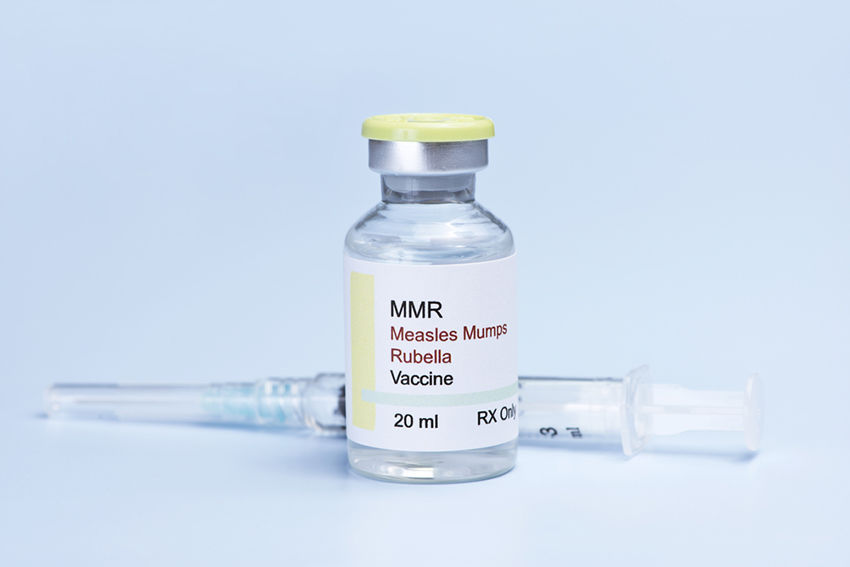Renee was 19 and pregnant for the first time, with twins, when she came down with measles. It was in the late 1950s, long before vaccines. Somehow, she had managed to avoid getting the disease as a child, despite being the eldest of a family of six children in a neighborhood full of kids.
She worried about the effect of the infection during pregnancy; measles in early pregnancy was known to cause birth defects. About a week into the infection, she lost her babies. It was about the same time a neighbor’s child came down with the rash. She survived the infection but was left nearly deaf.
We’ve lost the understanding of just how devastating childhood diseases are. Prior to the development of the measles vaccine, there were about half a million cases a year. Of these, nearly 10 percent required hospitalization because of the severity of the infection or complications. There were about 500 deaths annually from the disease. Globally, measles remains a problem: almost 270,000 cases reported every year, with nearly 150,000 estimated deaths. It’s no wonder the measles vaccine was hailed as a public health triumph. Even so, measles is on the upswing these days because of an increasing number of those who have not been vaccinated against the disease.
Measles vaccine poses a potential ethical dilemma for Catholics: the vaccine was developed and produced using cell lines grown from aborted fetuses. For this reason, some Catholics, aware of the Church’s teaching against cooperating with evil, wonder whether they can legitimately use it.
The question was posed directly to the Pontifical Academy for Life. The academy concluded that Catholics couldn’t simply ignore that these vaccines are ultimately associated with abortion. Making our voices heard in the public square — lobbying for alternative vaccine sources, making sure our doctors know that the use of tissues from aborted babies is not acceptable — these remain a clear obligation for us all. Such opposition is particularly imperative for those who choose to accept the vaccine.
However, the academy also concluded that — under present circumstances — the use of these vaccines is so remote from the initial act of abortion that there is no moral obligation to refrain from using them, particularly considering that there are not yet alternative vaccines that are not linked to abortion available in the U.S. They reasoned that parents have a moral obligation to act for the good of their children; vaccination against a childhood disease with such terrible potential for injury is one of those situations and the link to abortion is too tenuous (both passive and remote) to offset that obligation.
There is also the common good to be considered: our decisions have effects on others. Both Minnesota and California have experienced severe outbreaks as a result of unvaccinated individuals susceptible to infection. This creates a serious problem for the elderly, for cancer patients whose immune system is weakened by treatment, and for babies too young to be vaccinated: the three groups most likely to be infected and to have serious complications. Avoiding exposure becomes difficult for these individuals; they are essentially confined to home until the threat passes. A visit to the store, to church or to the doctor’s office can result in exposure.
Measles — like the common cold — is transmitted through the air and by contact with contaminated surfaces. The virus can live for several hours outside the body, meaning that the infected person and the exposed person may not actually cross paths. Infected people are contagious long before the telltale rash appears, making it even more difficult to contain outbreaks.
But it’s also clear: these vaccines pose a moral problem that should be eliminated. The Pontifical Academy summarized it this way: the current situation poses an unjust choice — a decision made under the coercion of circumstances they cannot control — for parents who must choose between accepting a vaccine made linked to abortion and risking the health of their children and society at large. This unjust choice must be eliminated as soon as possible. Whatever one’s personal choice regarding MMR vaccination under the present circumstances, the obligation to work for vaccines that are not linked to abortion is clear.
Children of God for Life has answered the call issued by the Pontifical Academy for Life and is working hard for development of morally produced vaccines. Their website keeps track of what vaccines are linked to cell lines from aborted fetuses, tracks the progress of new, more acceptable vaccines, provides information on the use of materials from abortion in medicine, as well as providing opportunities for personal action.
Barbara Golder had a 40-year career in medicine and law, including health care ethics. She is now the award-winning author of the Lady Doc mystery series and serves as Director of Adult Faith Formation and Evangelization at the Basilica of Sts. Peter and Paul, Chattanooga TN. She blogs at ladydoclawyer.com.

